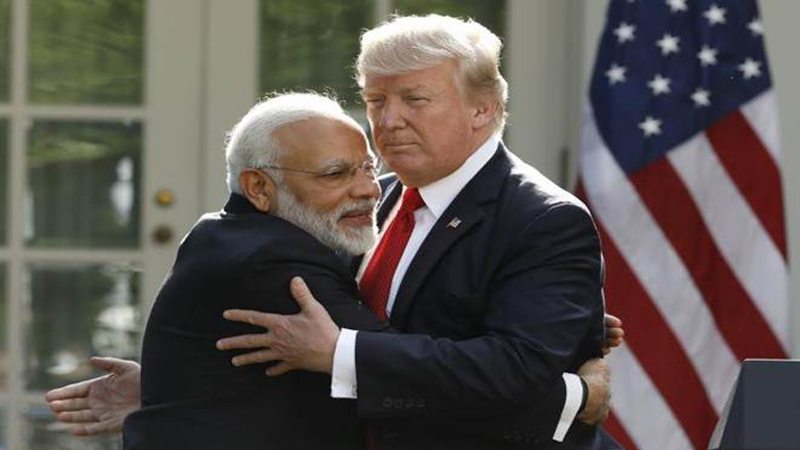
Threats to minority rights and democratic norms are ignored to preserve a comforting illusion
Gideon Rachman November 11 2019 The Financial Times
The world’s democracies are desperate to believe in India. From Washington to Tokyo, and from Canberra to London, the country is viewed as an indispensable counterbalance to China. The two Asian giants are the only countries in the world with populations of over 1bn people.
Last year America’s Defense Department renamed its Pacific command the Indo-Pacific command — a reconception of the geopolitical map that is clearly intended to balance Chinese power by bringing India into the picture. In September, Narendra Modi, India’s prime minister, appeared alongside US president Donald Trump at a Texas rally. In Europe, India is lauded as the world’s largest democracy — a refreshing contrast to you-know-where.
The west’s investment in India is now strategic, emotional, intellectual and financial. But the sunk costs of that investment mean that western countries are reluctant to acknowledge the dark side of Mr Modi’s India — in particular, threats to minority rights and the erosion of democratic norms.
Since Mr Modi won a crushing re-election victory earlier this year, the alarming side to his government has come increasingly to the fore. On August 5, it abolished the special constitutional status of the majority-Muslim state of Jammu and Kashmir — and followed up with a broad clampdown on civil liberties, including the detention-without-trial of leading Kashmiri politicians. Opposition politicians, human rights activists and Delhi-based foreign correspondents have been prevented from visiting the region.
There is also rising anxiety about a citizenship-determination exercise in the state of Assam that has seen 2m of the state’s residents designated illegal immigrants, with no right to live in India. Mr Modi’s government says it carried out the exercise to comply with a Supreme Court order. But it is now building camps to hold those deemed illegal immigrants. It talks of extending the process across the country.
The weight of this campaign will fall hard on India’s Muslim minority. The administration is expected to push through a new citizenship law that will give any Hindu deemed to be fleeing persecution in a neighbouring country, the automatic right to Indian citizenship. So only Muslims will be at risk of being deemed illegal residents.
The sense that the political winds are moving against India’s Muslims will be strengthened by this week’s Supreme Court ruling that a Hindu temple can be built on a long-contested holy site in the city of Ayodhya. Hindu nationalists, whipped up on social media, are delighted by Mr Modi’s increasing boldness. But some of the country’s leading intellectuals are sounding the alarm. Amartya Sen, a Nobel Prize-winning economist now resident in the US, told The New Yorker magazine that his friends are reluctant to criticise the government on the phone, adding, “People are afraid. I’ve never seen this before.” Alarmed by the increasingly compliant judiciary (and much of the media), Pratap Bhanu Mehta, an eminent Indian academic, has written that: “The noose is tightening around all independent institutions in India.”
In its defence, the Modi administration can point to its undoubted popularity — confirmed in this year’s elections. The government still enjoys support from business, which appreciates the promise to cut red tape and a recent corporate tax cut. Mr Modi’s focus on the living conditions of the poor — in particular through the construction of more toilets to prevent “open defecation” — is also rightly praised.
But the economy is now slowing. Delhi and other Indian cities are suffering a crisis over air-quality. Under these conditions, the argument that Mr Modi’s strongman style might be a price worth paying for economic progress is harder to make.
The Trump administration’s failure to make a fuss about human rights reflects more than strategic and diplomatic calculation. In important respects, Mr Trump and Mr Modi are ideological soulmates. They are both assertive majoritarians, scornful of liberal concerns with minority rights. They have promised to crack down on illegal immigration and have stoked fears of Islamic extremism — partly as a way of consolidating their political base.
Mr Modi’s many defenders argue that one of his great strengths is that, like Mr Trump, he is in touch with “the common man” — he cares little for the opinions of urban elites. The Indian government could also borrow a phrase from the Israelis, who like to remind foreign critics that they “live in a tough neighbourhood”.
There is little doubt that religious and ethnic minorities have fared worse in many of India’s neighbours — including Pakistan, Myanmar, Sri Lanka and China. But India used to take pride in its status as a tolerant, multifaith democracy. The Modi government’s increasingly strident Hindu nationalism is putting that achievement at risk.
The west’s fear of China means that it is likely to continue to give Modi’s India a free pass for some time. But a failure to talk openly about the failings of the Modi model is not cost-free. The danger is that the west is embracing a comforting illusion — that democratic India will act as an ideological bulwark against authoritarian China. The reality is that India’s slide into illiberalism may actually be strengthening the global trend towards authoritarianism.
The article appeared in the Financial Times on 11 November 2019
